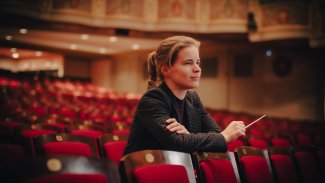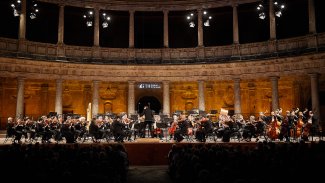






Tabita Berglund
“There was nothing ordinary about these riveting performances […] under the charismatic direction of young Norwegian conductor Tabita Berglund. […] Rarely have I heard such a responsive and alert-sounding orchestra, playing these works as if they were first performances”
(Bachtrack, May 2024)
Principal Guest Conductor: Detroit Symphony Orchestra
Principal Guest Conductor Designate: Dresdner Philharmonie (from season 2025/26)
Tabita Berglund is one of today’s most exciting, talented and in-demand young conductors who has gained a reputation for her alert, charismatic and inspiring style which elicits “exceptional music-making” (The Arts Desk). This season, Berglund begins her four-year tenure as Principal Guest Conductor of Detroit Symphony Orchestra, and from 2025/26 she holds the same title with Dresdner Philharmonie; she was appointed to each position following her respective debut.
Symphonic highlights of 2024/25 include debuts with Los Angeles Philharmonic, Houston Symphony, Minnesota Orchestra, Gothenburg Symphony, Bamberger Symphoniker, Gürzenich-Orchester Köln, Orchestre de chambre de Paris, Polish National Radio Symphony Orchestra, Iceland Symphony Orchestra and Lahti Symphony Orchestra, as well as Berglund’s inaugural weeks as Detroit Symphony Orchestra’s Principal Guest – the first featuring the US premiere of Anna Clyne’s violin concerto Time and Tides with fellow HarrisonParrott artist Pekka Kuusisto. Other notable season highlights include Berglund’s Asian debut with Tokyo Metropolitan Symphony Orchestra, her Salzburg Easter Festival debut together with Mozarteum Orchester Salzburg, a European tour with Orchestra della Svizzera Italiana, and returns to Dresdner Philharmonie, Royal Stockholm Philharmonic Orchestra, Orchestre national de Lyon, Tonkünstler-Orchester Niederösterreich and Trondheim Symphony Orchestra. In December 2024 she conducts The Norwegian National Ballet in 12 performances of Tchaikovsky’s The Nutcracker.

Show More
Berglund regularly collaborates with internationally renowned soloists; recent and upcoming partnerships include Jean-Yves Thibaudet, Leila Josefowicz, Truls Mørk, Cédric Tiberghien, Nicolas Altstaedt, Håkan Hardenberger, Alexander Malofeev, the Jussen brothers and Camilla Tilling, to name a few. In 2024/25 she continues to champion the music of Nordic compatriots such as Thorvaldsdottir, Saariaho, Sibelius, Svendsen and Irgens Jensen, as part of a wide-ranging repertoire from Mozart and Beethoven to Dvořák, Mussorgsky, Poulenc, Lutosławski and Britten, among many others.
Recent engagements include Dallas Symphony Orchestra, Detroit Symphony Orchestra, Swedish Radio Symphony Orchestra, Finnish Radio Symphony Orchestra, Dresdner Philharmonie, Philharmonia Orchestra, Orchestre national de Lyon, Bergen Philharmonic Orchestra, Berner Symphonieorchester, City of Birmingham Symphony Orchestra, BBC Scottish Symphony Orchestra and Düsseldorfer Symphoniker, among many others. Festival appearances include Festival Internacional de Música y Danza de Granada and Grafenegg, while Berglund made her Garsington Opera debut in Summer 2024 conducting a revival production of Mozart’s Le nozze di Figaro. She concluded her three-year tenure as Principal Guest Conductor of Kristiansand Symphony Orchestra at the end of 2023/24. In August 2024 she chaired the jury for the grand finale of the Eurovision Young Musicians competition, broadcast live on television throughout Europe via the major networks.
Berglund studied at the Norwegian Academy of Music, first as a cellist with Truls Mørk and later orchestral conducting with Ole Kristian Ruud. She played regularly with the Oslo and Bergen Philharmonic orchestras as well as the Trondheim Soloists before conducting became her main focus. Her debut CD, with Oslo Philharmonic and violinist Sonoko Miriam Welde, was released in 2021 (LAWO) and nominated for a Norwegian Grammy (Spellemann) in the 2022 Classical Music category.
HarrisonParrott represents Tabita Berglund for worldwide general management.
Contacts
Jasper Parrott Executive Chairman HP Group & Associated Companies Paul Littlewood Administrator, Artist Relations
worldwide general management
Paul Littlewood Administrator, Artist Relations
Paul Littlewood Administrator, Artist Relations
worldwide general management
Season Highlights
Auditorium de Lyon
Show more about Auditorium de Lyon
KAIJA SAARIAHO: Lumière et pesanteur
LUDVIG IRGENS JENSEN: Passacaglia
JEAN SIBELIUS: Lemminkäinen Suite (Four Legends from the Kalevala)
Grosses Festspielhaus
Show more about Grosses Festspielhaus
Extracts and arias from Tchaikovsky’s Eugene Onegin and Pique Dame, Dvořák’s Rusalka, Giordano’s Fedoraand Andrea Chénier, and Verdi’s Macbeth
Théâtre des Champs-Elysées
Show more about Théâtre des Champs-Elysées
JOHAN SVENDSEN: Zorahayda, Op. 11
EDWARD ELGAR: Concerto for Cello
FRANZ SCHUBERT: Symphony No. 8
Konzerthalle Bamberg
Show more about Konzerthalle Bamberg
PYOTR ILYICH TCHAIKOVSKY: Romeo and Juliet Fantasy Overture
WOLFGANG AMADEUS MOZART: Concerto for Piano No. 20 in D minor, K466
SERGEI PROKOFIEV: Selection from Romeo and Juliet Suites 1, 2 and 3
Show more season highlights
Hollywood Bowl
Show more about Hollywood Bowl
JOHANNES BRAHMS: Concerto for Piano No. 1
EDVARD GRIEG: Peer Gynt: Prelude
EDVARD GRIEG: Peer Gynt: Suite No. 2
EDVARD GRIEG: Peer Gynt: Suite No. 1
Kulturpalast Dresden
Show more about Kulturpalast Dresden
ROLF GUPTA: Epilog from Jordens Sang
ANTONIN DVORAK: Concerto for Cello in B minor, Op. 104
BÉLA BARTÓK: Concerto for Orchestra
“Without any histrionics, her expressive but disciplined manner on the podium consistently conveyed meaningful gestures to generate inspirational performances. Rarely have I heard such a responsive and alert-sounding orchestra, playing these works as if they were first performances. Without doubt, Berglund is someone to watch.”
“Berglund negotiated the transition into the Finale neatly, and thereafter perfectly judged its accumulating drama to create a magnificent life affirming traversal. There have been countless performances of this symphony by the Philharmonia over the years, but this emotionally charged account was one of the most vivid I’ve heard in a long time.”
“Tabita Berglund […] seems certain to become one of the most significant conductors from her generation. […] The acute characterization that [she] brought to each episode, then the emotional frisson when those main motifs come together for a powerful apotheosis, compelled admiration – as did the closing pages in which Sibelius cannily fragments form and texture so all that remains is an all-enveloping silence.”
“Tabita Berglund’s conducting style – alert, encouraging and inspiring – seems to bring out exceptional music-making.”
“(Berglund) is considered one of the most talented conductors of her generation and after this concert it is not difficult to understand why. She has an equally emotional and analytical relationship with the material and the communication with the musicians seems frictionless.”
“… at the helm here was the young Norwegian conductor Tabita Berglund, whose unfussy interpretation held poise and vigour. This is her second appearance with the Hallé, and her smiling warmth matched the Idyll’s radiance perfectly. The boundless energy that underpins her approach was best suited to the Beethoven that closed the concert. […] There was room for a rich Allegretto, too, in as athletic a Seventh as you’ll hear, leaving an appreciative if reduced Manchester audience invigorated.”
“(Berglund is) very capable of taking an orchestra with her in her ideas of how music should sound: she smiles encouragingly at the players a lot and makes constant eye contact […] She exudes confidence, and so does her music-making.”
“We take advantage of the somewhat disconcerting habit of giving hurricanes personal names to sum up the experience of what it means to see Tabita Berglund direct. Only, in this case, the metaphor alludes only to her overwhelming momentum and energy, without any of the negative connotations […] The result [in Beethoven’s Seventh Symphony] was forceful and jovial, brilliant but without being strident or tiresome […] The orchestra let itself be carried away and excelled at an extraordinary level of virtuosity and good sound. If the reports of the time detail that at its premiere the symphony was applauded to ecstasy, here the audience was able to renew their amazement and enthusiastic ovation.”
“Berglund led the four dozen or so [Royal Scottish National Orchestra] musicians with confidence, masterful direction, and expressions of pleasure and encouragement. Conducting with a baton, she has a very vigorous style, moving her arms energetically in conspicuous arcs. This works well in electrifying the orchestra as she transforms individual passages into a cohesive musical unity. In the physically smaller orchestra, the woodwinds and brass could have easily over-shadowed the strings, but Berglund never let the balance tip too far in their favour.”
“[But] Tabita Berglund managed to give this relatively heavy work new life! Powerful string sound, beautiful woodwind solos, shiny brass instruments […] Certain passages were actually reminiscent of film music, and the experience was completely different compared to hearing the work through the speakers at home – a feat of the young conductor!”





















